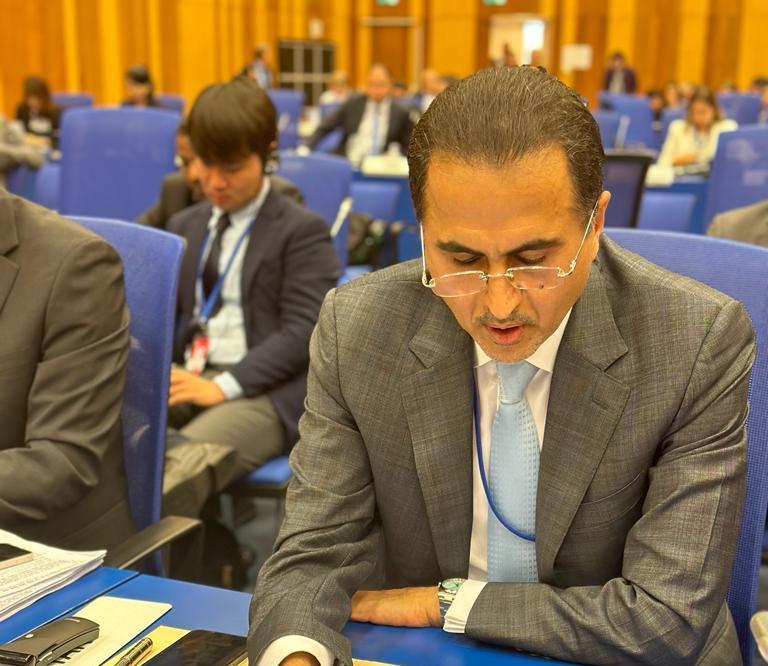State of Qatar Affirms Importance Nuclear Non-Proliferation System

Vienna - Media & Communication Dept. - August 02
The State of Qatar affirmed the importance of enhancing the Nuclear Non-Proliferation Treaty (NPT) system to ensure that nuclear activities are not diverted for other purposes, highlighting the essential role of the International Atomic Energy Agency (IAEA) safeguards system, along with the Additional Protocol, as cornerstones of the international verification regime, in achieving the objectives of the NPT.
This statement was delivered by HE Director of International Organizations Department at the Ministry of Foreign Affairs of Qatar Ali bin Khalfan Al Mansouri, during the general debate of the first preparatory committee for the eleventh review conference of the NPT, currently held in Vienna.
He said that the IAEA remains the only international organization concerned with nuclear verification, and all of us need to support its efforts to carry out this role. He emphasized that the international verification system will remain limited without accompanying efforts to halt the nuclear arms race, reduce nuclear arsenals, and ultimately achieve complete nuclear disarmament.
His Excellency further mentioned that they begin the work of the first preparatory committee for the 2026 review conference following the consecutive failures of the 2015 and 2022 review conferences, amid the deteriorating international geopolitical environment, where expanding and horizontal nuclear arsenals pose the most serious threat to humanity and civilization.
He explained that the continuous international crises, conflicts, and global economic imbalances negatively impact the expansion and enhancement of peaceful uses of atomic energy, especially in developing countries, which suffer from declining opportunities for sustainable development.
His Excellency emphasized the significance of the NPT as an effective tool for collective security through practical steps taken to implement its three pillars: nuclear non-proliferation, nuclear disarmament, and peaceful uses of atomic energy. He warned against the dangers of weapons of mass destruction, pointing out that they remain the only weapons that constitute a legal gap requiring acknowledgment that the dire consequences of their use on humanity and life on our planet can only be avoided through their complete and total elimination.
He stressed the urgent need to establish legally binding international instruments that grant non-nuclear-weapon states unconditional security assurances against the use or threat of use of nuclear weapons by the five nuclear-weapon states. He also called for identifying mechanisms to progress towards achieving this goal until the complete and comprehensive elimination of such weapons, referring to the advisory opinion of the International Court of Justice in 1996 that declared the illegality of the use or threat of use of nuclear weapons.
His Excellency said that the right to the peaceful use of atomic energy is an inherent right of states, and it is an integral part of their right to development, and one of the seventeen goals included in the United Nations' 2030 Agenda for Sustainable Development relies on nuclear science and technology.
He expressed appreciation for the efforts of the IAEA in promoting and expanding the contribution of atomic energy to peace, health, and prosperity worldwide, calling for strengthening its role in supporting the peaceful uses of atomic energy, especially through its technical cooperation program, which is the main tool for the transfer of peaceful nuclear technology to member states.
He urged advanced nuclear-industry states to provide scientific and technical assistance to developing countries in need of greater support and broader international cooperation to accelerate the implementation of the United Nations' 2030 Sustainable Development Goals.
Regarding the 1995 Review and Extension Conference decision on the Middle East, he stressed that it is an integral part of the indefinite extension of the Treaty and will remain in effect until its implementation and objectives are achieved. He pointed out that the responsibility to establish a Middle East zone free of nuclear weapons is a collective responsibility imposed by international documents and resolutions, including Security Council resolutions 487 (1981) and 687 (1991). He emphasized that the continued lack of progress towards establishing the zone carries serious consequences that threaten international and regional peace and security, and underscored the importance of correcting the course and taking concrete steps to achieve progress towards establishing the zone.
His Excellency called on Israel to accede to the NPT and to apply the safeguards system to its nuclear facilities, as such action would not only pave the way for the establishment of the zone but also contribute to the establishment of a just and lasting peace in the region. It would also enhance the credibility and universality of the Treaty and expedite the implementation of the goal of nuclear disarmament.

